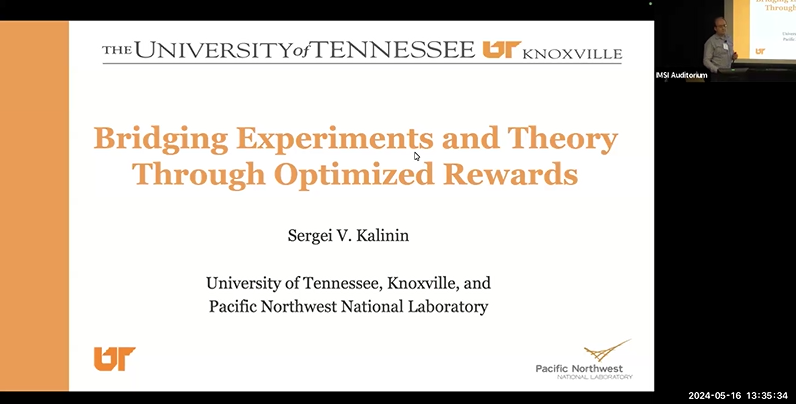Integrating Autonomous Systems for Advanced Material Discovery: Bridging Experiments and Theory Through Optimized Rewards
Presenter
May 16, 2024
Event: 41745
Abstract
The trajectory of scientific research worldwide is guided by long-term goals, spanning the spectrum from curiosity and fundamental discoveries in physics to the applied challenges of enhancing materials and devices for a wide array of applications. However, the execution and assessment of daily research efforts typically hinges on multiobjective reward functions, which can be evaluated either during or at the conclusion of an experimental campaign. Although this concept is tacitly acknowledged within the scientific community, the implementation of autonomous experimental workflows in automated laboratories necessitates the formulation of robust reward functions and their seamless integration across various domains. Should these reward functions be universally established, the entirety of experimental efforts could be conceptualized as optimization problems. Here, we present our latest advancements in the development of autonomous research systems based on electron and scanning probe microscopy, as well as for automated materials synthesis. We identify several categories of reward functions that are discernible during the experimental process, encompassing fundamental physical discoveries, the elucidation of correlative structure-property relationships, and the optimization of microstructures. The operationalization of these rewards function on autonomous microscopes is demonstrated, as well as strategies for human in the loop intervention. Utilizing these classifications, we construct a framework that facilitates the integration of multiple optimization workflows, demonstrated through the synchronous orchestration of diverse characterization tools across a shared chemical space, and the concurrent navigation of costly experiments and models that adjust for epistemic uncertainties between them. Our findings lay the groundwork for the integration of multiple discovery cycles, ranging from rapid, laboratory-level exploration within relatively low-dimensional spaces and strong basic physics priors to more gradual, manufacturing-level optimization in highly complex parameter spaces underpinned by poorly-known and phenomenological physical models.
Y. Liu, M. Ziatdinov, R. Vasudevan, and S.V. Kalinin, Explainability and Human Interventions in Autonomous Scanning Probe Microscopy, Patterns 4, (2023), arXiv:2302.06577
S.V. Kalinin, Y. Liu, A. Biswas, G. Duscher, U. Pratiush, K. Roccapriore, M. Ziatdinov, R. Vasudevan, Human-in-the-loop: The future of Machine Learning in Automated Electron Microscopy, arXiv:2310.05018
Y. Liu, A. Morozovska, E. Eliseev, K.P. Kelley, R. Vasudevan, M. Ziatdinov, and S.V. Kalinin, Autonomous scanning probe microscopy with hypothesis learning: Exploring the physics of domain switching in ferroelectric materials, Patterns 4 (2023) arXiv:2202.01089
Y. Liu, K.P. Kelley, R.K. Vasudevan, H. Funakubo, M.A. Ziatdinov, and S.V. Kalinin, Experimental discovery of structure-property relationships in ferroelectric materials via active learning, Nat. Mach. Int. 4, 341 (2022), arXiv:2108.06037
